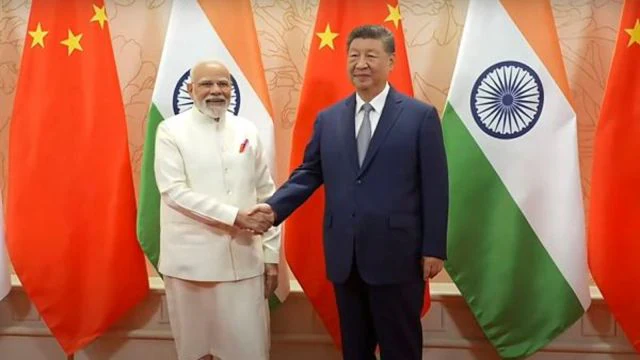Historic Reset: Modi and Xi Agree on Peace, Trust, and a Fresh Start for India-China Relations

Image via The Indian Express
31 August 2025, Tianjin — A major moment unfolded at the Shanghai Cooperation Organisation (SCO) summit when Indian Prime Minister Narendra Modi met Chinese President Xi Jinping. The two leaders sat down for an important bilateral meeting and sent out a strong message to the world. Modi made it clear that mutual trust, respect, and sensitivity should be the foundation of future India-China ties. Xi also welcomed the chance to reset relations.
Both sides said peace at the border has been maintained since disengagement. This was one of the most positive signs in recent years for the relationship between Asia’s two biggest neighbors.
Background of India-China Tensions
For many years, ties between India and China have been tense. The main reason has been the border standoff in Ladakh. Clashes in 2020 created mistrust. Both sides deployed soldiers and heavy equipment at the Line of Actual Control.
Since then, military and diplomatic talks have taken place. In the last two years, a series of disengagement steps were carried out. Soldiers pulled back from friction points. The atmosphere has slowly improved. Modi highlighted that this disengagement brought peace along the border, which is essential for stability.
Modi’s Message: Mutual Trust and Respect
Prime Minister Modi said clearly that India wants ties with China to be based on equality and sensitivity. He stressed that “mutual trust, mutual respect, and mutual sensitivity” must be the guiding principles.
He reminded Xi that after the Kazan meeting in 2024, a positive direction was set. The new border management agreement between the Special Representatives is an important part of this process. This deal is meant to keep peace and avoid misunderstandings in the future.
Steps Toward Normal Relations
During the talks, both leaders announced several positive steps:
- Kailash Mansarovar Yatra Resumed – The famous pilgrimage had been closed for years. Devotees can now travel again.
- Flights Restored – Direct flights between India and China have started again, easing travel for students, businesspeople, and families.
- Tourist Visas – Tourist visas were reopened, making visits easier for citizens of both countries.
- Border Agreement – A structured system of communication between armies is in place, reducing chances of conflict.
These measures show that both countries are serious about normalizing relations.
Xi Jinping’s Response
Chinese President Xi Jinping gave a warm response. He said India and China are ancient civilizations and modern powers. Xi noted that both nations should act as “friends and good neighbours.” He stressed that peace and friendship are the right choice for the future.
Xi also underlined that India and China, as leaders of the Global South, have a duty to promote development and stability in Asia and beyond. His words matched Modi’s vision of cooperation and mutual sensitivity.
Why This Meeting Matters
This meeting is important for several reasons.
- It is Modi’s first visit to China in seven years, which itself is a strong signal.
- Both countries have recently faced economic pressure from the United States. India has been hit with higher tariffs. China has faced restrictions on exports. In such a scenario, cooperation between New Delhi and Beijing is a counterbalance.
- The SCO platform gave them the chance to show the world that they are ready to move forward, not backward.
When two of the world’s largest economies and most populous nations find common ground, it has global impact.
A Timeline of Recent Positive Steps
- 2023: Initial talks on disengagement moved forward.
- 2024: A patrolling agreement reduced the chances of clashes.
- January 2025: Direct flights resumed.
- April 2025: Kailash Mansarovar Yatra restarted.
- July 2025: Tourist visas for Chinese visitors reopened.
- August 2025: Modi’s visit and bilateral talks in Tianjin.
Each of these steps has built confidence. Step by step, trust is being rebuilt.
Regional and Global Reactions
The world has been watching India-China ties closely. Many countries in Asia hope for stability because both nations are key trading partners.
In the West, analysts believe this meeting signals a possible new balance. With India facing friction with the US on tariffs, and China locked in disputes with Washington, closer India-China relations may influence global trade.
Neighbouring countries like Nepal, Bhutan, and Bangladesh also welcome peace on the Himalayan border. Stability between India and China creates a safer environment for the whole region.
Modi’s Emphasis on Global Responsibility
During the talks, Prime Minister Modi said that cooperation between India and China affects the lives of 2.8 billion people. He pointed out that both countries have a duty toward humanity. Their partnership can bring progress not just for their citizens but also for the world.
This statement shows India’s intent to rise as a responsible global player. By aligning with China on key issues, India can strengthen its position in global platforms like BRICS, G20, and SCO.
Eye on Future Cooperation
Analysts say that the meeting may open doors to cooperation in trade, technology, and climate change. The restoration of flights will help business contacts. The opening of pilgrimages and tourism will rebuild people-to-people trust.
If the border remains peaceful, both sides may move toward new economic projects. This could include investments, joint ventures, and cultural exchanges.